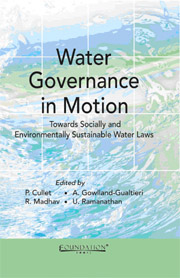Book contents
- Frontmatter
- Contents
- Acknowledgments
- Contributor Biographies
- Introduction
- I Water Law, Policy and Institutional Reforms in India
- II Ongoing Irrigation and Ground Water Reforms in India
- 5 Canal Irrigation, Water User Associations and Law in India – Emerging Trends in Rights-Based Perspective
- 6 Customary Rights and their Relevance in Modern Tank Management: Selected Cases in Tamil Nadu
- 7 Ground Water – Legal Aspects of the Plachimada Dispute
- III Perspectives on Privatisation
- IV Environment and Human Rights
- V Comparative Perspectives on Reforms
- Bibliography
5 - Canal Irrigation, Water User Associations and Law in India – Emerging Trends in Rights-Based Perspective
from II - Ongoing Irrigation and Ground Water Reforms in India
Published online by Cambridge University Press: 26 October 2011
- Frontmatter
- Contents
- Acknowledgments
- Contributor Biographies
- Introduction
- I Water Law, Policy and Institutional Reforms in India
- II Ongoing Irrigation and Ground Water Reforms in India
- 5 Canal Irrigation, Water User Associations and Law in India – Emerging Trends in Rights-Based Perspective
- 6 Customary Rights and their Relevance in Modern Tank Management: Selected Cases in Tamil Nadu
- 7 Ground Water – Legal Aspects of the Plachimada Dispute
- III Perspectives on Privatisation
- IV Environment and Human Rights
- V Comparative Perspectives on Reforms
- Bibliography
Summary
The present chapter seeks to examine the state of the formal Water User Associations that has been created in India through a series of state legislations in recent years from an essentially rights-based perspective. Given the bias in the legal system that recognises statutory rights to the exclusion of almost any other form of rights, the passing of these laws presents an opportunity to these Associations to see what effective rights have come their way through these laws. This has provided the immediate provocation for this chapter. The discussion below is premised in a larger context where first some conceptual links between decentralised water governance and rights are explored in the Indian context. This is followed by a brief comment on how the rights are a function of law making and whether the water users and the farmer identifies and owns the rights created for them and vested in them. The chapter then proceeds to examine the formal rights available to the Water User Associations in different states today and more particularly in Andhra Pradesh and Chhatisgarh while focusing on both their ‘internal and external rights’. It also suggests whether and how far they are precipitating a ‘group rights regime’ while tracing its inevitable linkage to the critical question of water entitlements and the state of the irrigation systems.
- Type
- Chapter
- Information
- Water Governance in MotionTowards Socially and Environmentally Sustainable Water Laws, pp. 111 - 128Publisher: Foundation BooksPrint publication year: 2010

